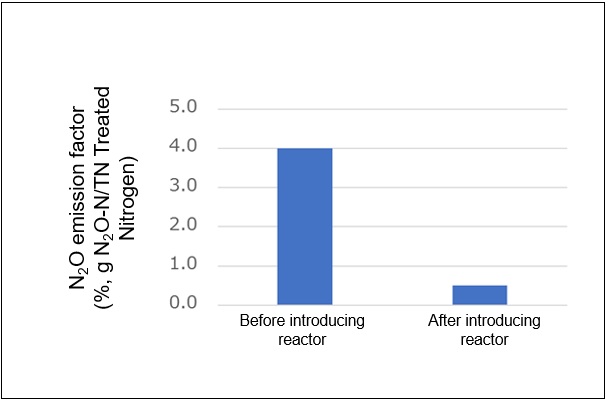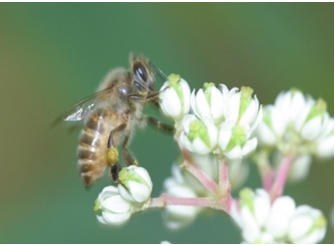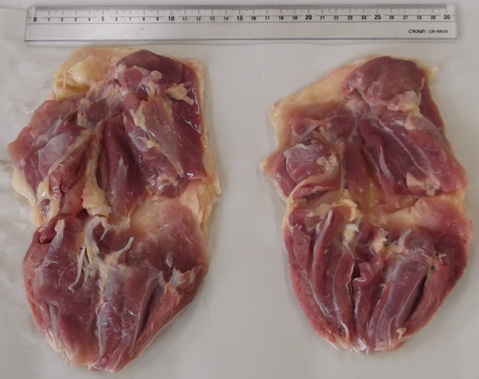
The National Agriculture and Food Research Organization (NARO) has developed a stable and long-lasting system for producing conditioned medium that improves the quality of bovine in vitro fertilized embryos. The three major challenges for this system to work, including (1) establishment of an immortalized bovine oviduct epithelial cell line, (2) confirmation of the development-promoting effects of the conditioned medium, and (3) isolation of the effective factors contained in the conditioned medium, have been resolved. This technology is expected to improve the quality of in vitro fertilized embryos, thereby increasing conception rates after embryo transfer. Read more
National Agriculture and Food Research Organization (NARO) has confirmed feeding damage by wild ducks and coots to the lotus roots in the mud of water-filled lotus fields. We experimentally placed lotus roots in a lotus field and recorded the waterfowl's behavior at night. As a result, Mallards and Eurasian Coots upended and ate the lotus roots to a depth of about 40 cm below the water surface. Mallards also dug mud with their legs. The results of this study can be used effectively against the lotus root damage (approximately 300 million yen per year) around Lake Kasumigaura, which accounts for about 10% of the agricultural crop damage caused by birds in Japan. This knowledge is indispensable for effective damage control measures based on scientific evidence. Read more
National Agriculture and Food Research Organization (NARO) has developed a new calculation equation that makes it easier to use than the conventional calculation equation for methane emissions from rumen fermentation in cattle from the ratio of methane to carbon dioxide in exhaled breath measured by a milking robot. The climate change mitigation consortium, represented by NARO, has published a manual for estimating methane, including this research result. By using this manual to calculate methane emissions from cattle, it is possible to more easily compare individual differences in methane emissions and differences in methane emissions due to feed. Read more
JIRCAS, in collaboration with the National Agriculture and Food Research Organization (NARO), the University of Miyazaki, and Can Tho University in Vietnam, has conducted a life-cycle assessment (LCA) to evaluate the effects of reducing greenhouse gas (GHG) emissions, which contribute to global warming, and reducing environmental impact in the rural areas of the Mekong Delta. External Link: JIRCAS
Researchers from National Agriculture and Food Research Organization(NARO) et.al have revealed that the maturation of wild sika deer is accelerated by consumption of agricultural crops from the analysis of the nitrogen stable isotope ratios (δ15N value) of deer bone collagen. This result indicates that preventive measures for invasion of deer into farmland and culling of individuals causing feeding damage of agricultural crops are effective in controlling agricultural damage not only now but also in the future. Moreover, since the δ15N value was effective as an index of agricultural crop consumption of deer, it can be expected to be used for elucidating the characteristics of individuals causing feeding damage of agricultural crops using the δ15N value and for developing deer damage management strategies. Read more

NARO, in collaboration with Okayama Prefectural Technology Center for Agriculture, Forestry, and Fisheries, Research and Okayama JA Livestock Co., Ltd. has demonstrated at the farm facilities that the greenhouse gas emissions can be reduced by approximately 80% in swine wastewater treatment facilities by introducing a carbon fiber reactor we developed. By introducing this reactor to processing facilities nationwide, it is estimated that it can reduce 6 hundred thousand tons carbon dioxide equivalent (CO2-eq) of greenhouse gas emissions annually. This achievement of reduced greenhouse gas emissions will contribute to the sustainable livestock production. Read more

The Institute of Livestock and Grassland Science, NARO (NILGS) and Institute of Agro-biological Science (NIAS), in collaboration with the Tokyo University of Agriculture and Kyoto Sangyou University, has succeeded in deciphering the full genome sequence of the Japanese honey bee. Japanese honey bee has many useful properties including strong disease resistance as compared to the Western honey bee. Disease resistance of both honey bees can be analyzed at the genetic level by means of comparing the genome of the decoded Japanese honey bee with that of Western honey bee. This result will contribute to the development of more useful technologies for utilization of honey bees.Read more

The Institute of Livestock and Grassland Science, NARO (NILGS-NARO) has succeeded in improving the growth performance in four Japanese slow-growing brand chickens, i.e., Hinai-jidori, Okumino-kojidori, Amakusa Daioh cross, and Miyazaki-jitokko, by molecular marker-assisted selection, in collaboration with the Akita Prefectural Livestock Experimental Station, the Gifu Prefectural Livestock Research Institute, the Kumamoto Prefectural Agricultural Research Center, and the Miyazaki Prefectural Livestock Research Institute. It is expected to be applicable for improving growth performance of the other slow-growing chickens.Read more